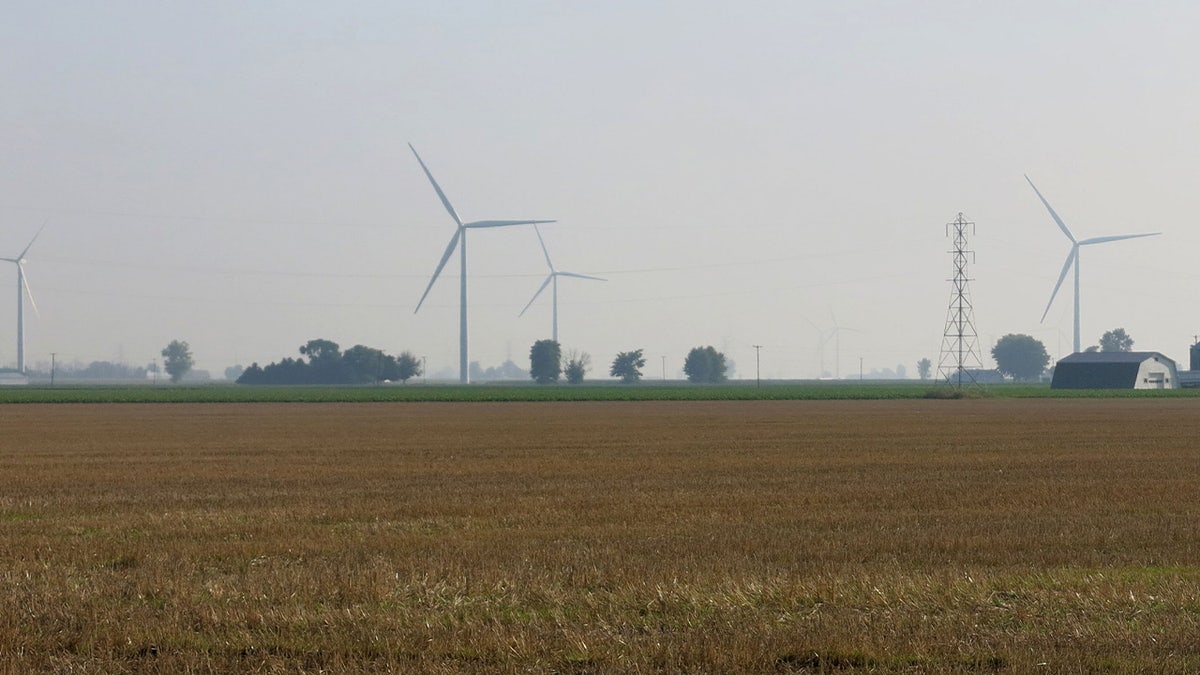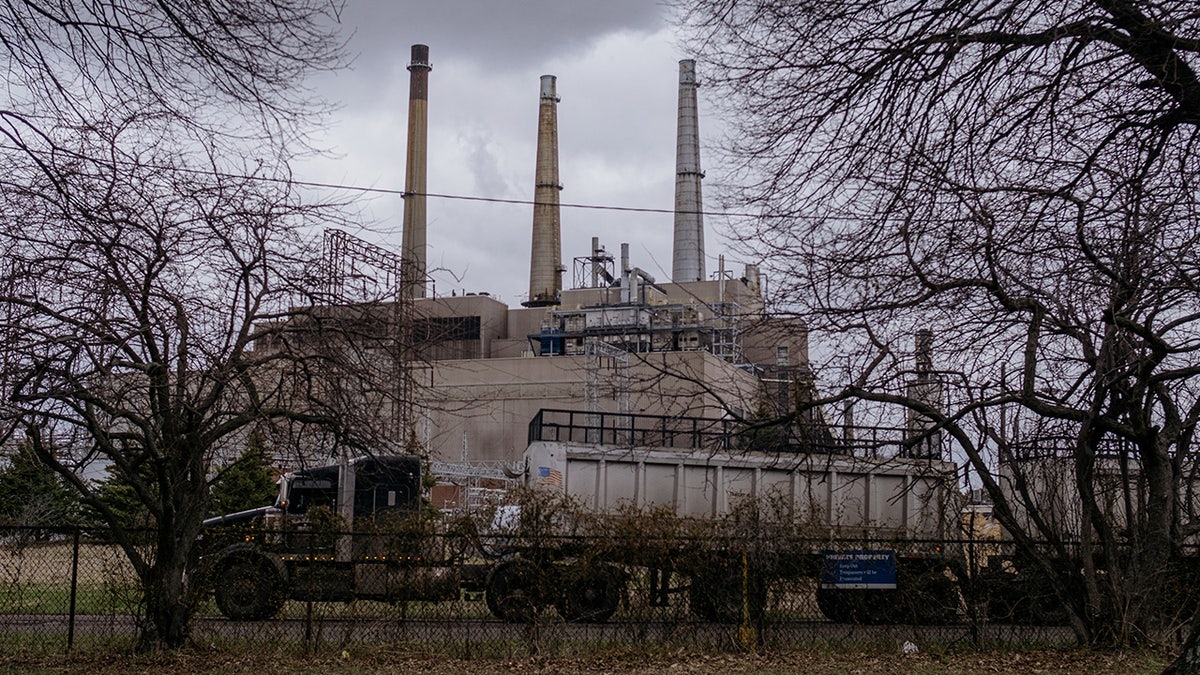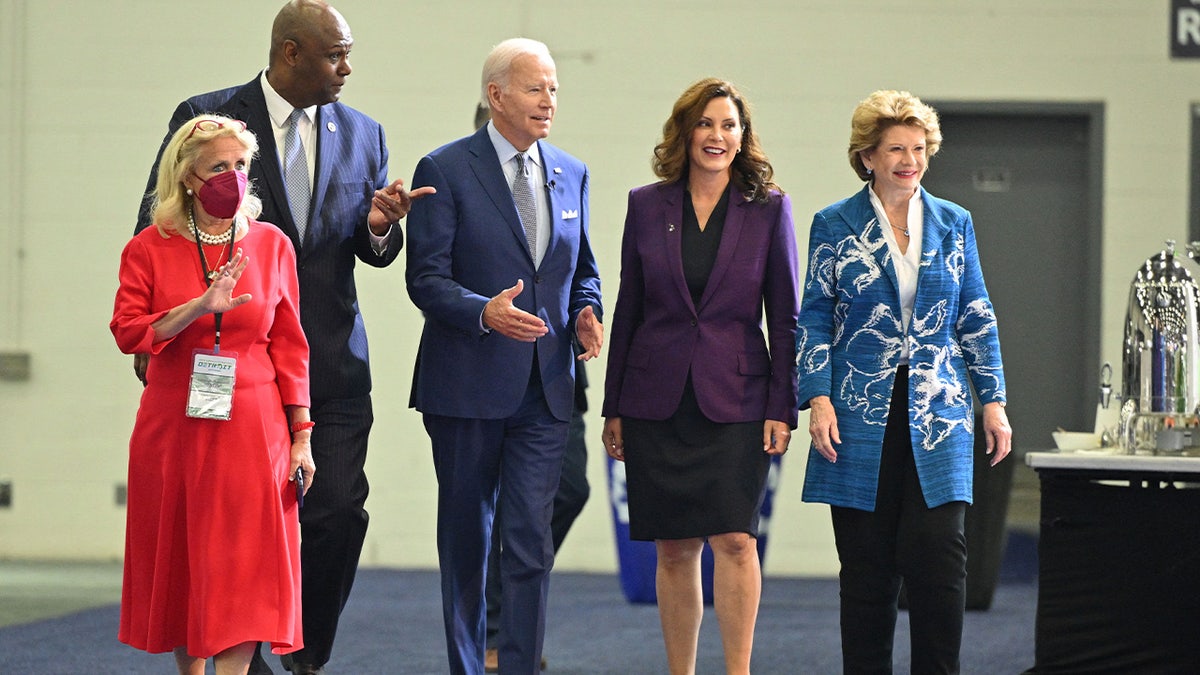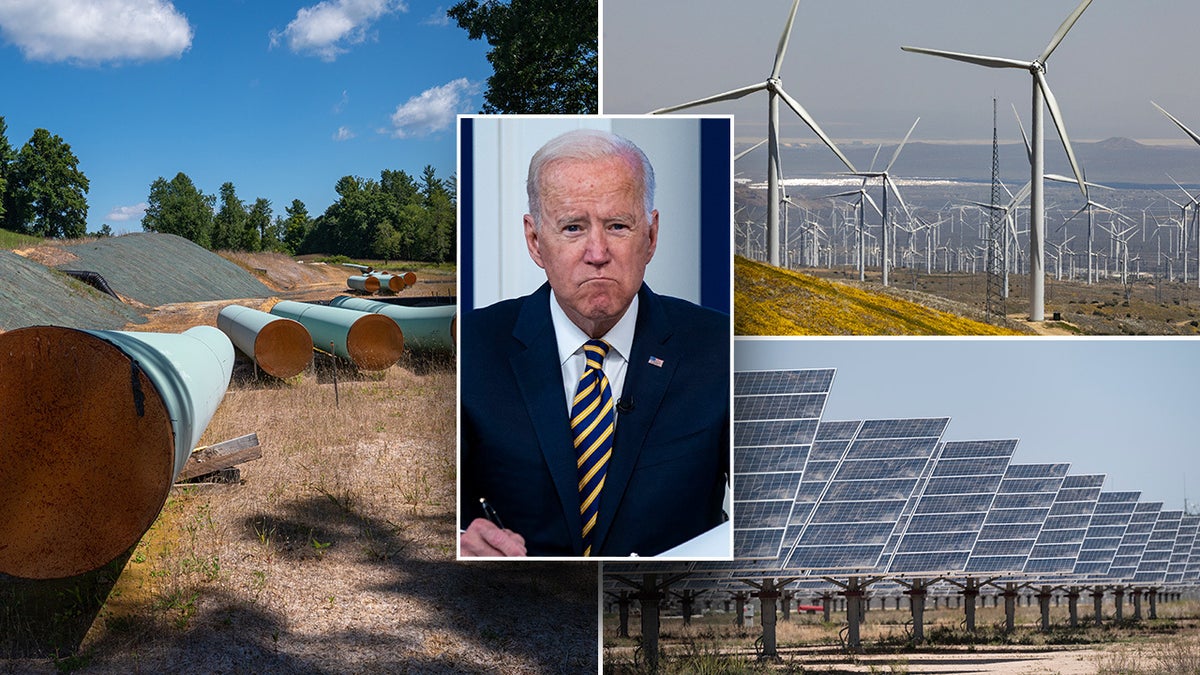Liberal media props up Gov. Gretchen Whitmer for 2024
Former presidential candidate Mike Huckabee joins 'Fox & Friends First' to discuss the possibility of a presidential run by Michigan Gov. Gretchen Whitmer and the calls for his daughter, Gov. Sarah Sanders, to remove the cross outside her home.
Michigan Democrats led by Gov. Gretchen Whitmer are leading an aggressive effort to rapidly transition the state to green energy, a push that closely resembles the Green New Deal proposed at the federal level by progressive lawmakers.
Democrats in the state's House and Senate — which are both simultaneously under Democratic control for the first time since the 1980s — have proposed and, in some cases, passed various pieces of energy-related legislation expanding top-down control over renewable energy development and establishing some of the most aggressive clean energy goals in the nation.
"These bills will balance reliability and affordability and help us protect our air and our water and improve public health," Whitmer said Thursday evening. "They will help us bring home more cutting-edge manufacturing investments so we can make solar panels, wind turbines, and more right here in Michigan, supporting good-paying jobs, high-skill jobs that are a ticket to the middle class."
"And they will make Michigan a national leader in clean energy, shoring up our position as the best place to start your family, your career, or your business."
BIDEN ADMIN PAVES WAY TO CEASE ALL OFFSHORE CALIFORNIA FOSSIL FUEL DRILLING OPERATIONS

"We can achieve 100% clean energy," Michigan Gov. Gretchen Whitmer said in August. (AP Photo/Paul Sancya, File)
Whitmer's comments came shortly after the state Senate passed a sweeping package of bills, the so-called Clean Energy Future plan, that Democrats said marked a significant step toward combating global warming. Democratic state Sen. Sean McCann said the bills would ensure a "greener and more environmentally conscious Michigan."
Senate Bill 271, one of the bills included in the package, establishes a renewable energy standard of 50% by 2030 and 60% by 2035, meaning electric utilities meet at least that share of their electric generation capacity with renewable energy credits or direct renewable energy generation. Current laws require utilities to achieve a 15% renewable energy standard through 2029.
GOP GOVERNOR SLAMMED FOR PUSHING GREEN ENERGY DURING HARVARD SPEECH: 'I WAS EMBARRASSED'
In addition, under the bill, utility providers must meet an 80% clean energy standard by 2035 and 100% clean energy standard set to be achieved by 2040. The clean energy standard would include natural gas-fired generation with 90% carbon capture, a nascent and expensive technology that hasn't been deployed at any power plant nationwide.
"Let’s enact a 100% clean energy standard for Michigan," Whitmer said in August. "This means all the energy we produce will be from wind, solar, or other commonsense sources. It means clean air for our kids to breathe and safe water for them to drink. And it means protecting our lakes for generations to come. We can achieve 100% clean energy while balancing reliability and affordability."
Whitmer first unveiled her MI Healthy Climate Plan which laid out a broad plan for the state to achieve carbon neutrality by 2050 and outlined other environmental policies including expanding electric vehicle charging infrastructure, decarbonizing the residential sector and boosting conservation.

A wind farm is pictured outside Traverse City, Michigan. (Elizabeth W. Kearley/Getty Images)
However, Republican state lawmakers and energy experts in Michigan have cast doubt on the aggressive clean energy goals that Whitmer and her fellow Democrats have pursued, including their goal to make the entire state power grid carbon free.
"I know our governor wants to keep up with [Democratic California Gov. Gavin Newsom], but duplicating his failures just to get some talking points for her future Democratic primaries is a silly idea," Michigan state Rep. Pauline Wendzel, who serves as Republican vice chair of the state House Energy, Communications, and Technology Committee, told Fox News Digital in an interview. "It's not only silly, it's dangerous."
"We should be bringing in industry experts and taking our time and talking about these things — not just rushing something through in the dead of night because people are going to get hurt," she continued. "It's going to hurt our constituents, it's going to hurt our state, it's going to hurt our economy — it's dangerous what they're doing."
CALIFORNIA'S GRID FACES COLLAPSE AS LEADERS PUSH RENEWABLES, ELECTRIC VEHICLES, EXPERTS SAY
According to Energy Information Administration data reviewed by Fox News Digital, Michigan routinely ranks among the top five states in residential use of natural gas and in the top 10 for total natural gas consumption. More than 75% of Michigan residents rely on natural gas as their primary source for home heating.
Natural gas-fired power plants produce by far the largest share of the state's electricity, the most recent data showed, followed by nuclear energy and coal-fired power. By comparison, solar and wind power collectively produce just 8.1% of the state's electricity.

The shut-down River Rouge coal-fired power plant is pictured in River Rouge, Michigan, on April 19, 2022. DTE Energy retired the plant in 2021 as part of the energy company’s "clean energy transformation." (Erin Kirkland/Bloomberg via Getty Images)
Under state Democrats' Clean Energy Future plan, the average monthly electric bill would be nearly double the current average in coming decades, according to a forthcoming report from the Mackinac Center for Public Policy, a free market think tank which analyzed the package of energy bills. The report further warns that overall grid reliability would be severely diminished under the plan.
"The biggest thing is prices are going to go up, reliability is going to go way down and people are going to be left sitting in the cold in Michigan in January, like our modeling shows, for as much as 61 hours without electric service because of these plans," Jason Hayes, the Mackinac Center's director of energy and environmental policy and one of the report's authors, told Fox News Digital in an interview.
"Where if we decided to do it with reliable sources of energy like fossil fuels, we could do it for far less and avoid those outages, avoid the blackouts. So, to me, it seems a no-brainer. We should be doing it for less money and more reliability," he continued.
Hayes added that the intermittent nature of solar and wind, meaning they produce less power relative to their total generation capacity, could create instability. Green energy developers and government officials often highlight total capacity of new renewable power projects, but fail to mention how much actual power the project is expected to produce.
Solar panels, for example, produce just 25% and wind turbines produce 34% of their listed capacity, according to federal data. Coal, natural gas and nuclear power plants, meanwhile produce 49%, 54% and 93% of their listed capacity, respectively.

President Biden, Michigan Gov. Gretchen Whitmer and other lawmakers arrive to tour the 2022 North American International Auto Show in Detroit where they highlighted electric vehicle manufacturing. (Mandel Ngan/AFP via Getty Images)
Additionally, Hayes criticized further legislation passed in the Michigan state House earlier this month that would transfer permitting authority for large-scale green energy projects from local control to Michigan Public Service Commission, the state regulator. The move would ensure such projects move forward over widespread local opposition.
LOBBYISTS FOR CCP-TIED EV COMPANY FUNNELED CASH TO DEMOCRATS AFTER FILING AS FOREIGN AGENTS
"As Michigan Democrats try to outlaw reliable natural gas power plants, mandate unreliable wind and solar, and override local decisions, they’re ignoring the voices of the families most harmed by their radical plans," Michigan House Republican Leader Matt Hall said on Oct. 18. "People want affordable electricity, but the left-wing plan to close power plants would drive their electric bills up."
"People want a say over windmills and solar farms in their communities, but Democrats know they can’t enforce their own expensive wind and solar mandates without steamrolling our communities and letting the Whitmer administration call the shots," Hall added. "We deserve reliable, affordable electricity and a say in our communities, not the extreme agenda of the House Democrats."
Whitmer's office didn't immediately respond to a request for comment.

Democrats in Michigan are pushing a rapid green energy transition as the Biden administration efforts similar policies at the federal level. (Getty Images)
The green energy push in Michigan comes amid a nationwide push spearheaded by President Biden and other Democratic-controlled states like California. But policies to quickly retire natural gas- and coal-fired generation and replace it with primarily wind and solar power have faced increasing pushback from nonpartisan grid operators and watchdogs.
In its annual report released in December 2022, the North American Electric Reliability Corporation, a nonpartisan grid watchdog, stated that large swatch of the U.S. faced a "high risk of energy or capacity shortfall" in coming years, particularly during summer months, as a result of traditional power plant retirements and increased demand.
CLICK HERE TO GET THE FOX NEWS APP
"Capacity deficits, where they are projected, are largely the result of generator retirements that have yet to be replaced," the report stated. "While some areas have sufficient capacity resources, energy limitations and unavailable generation during certain conditions (e.g., low wind, extreme and prolonged cold weather) can result in the inability to serve all firm demand."
"Two major concepts that came out of our report this year are about the transformation and being able to manage the pace of transition in an orderly way and that making sure new resources, when they are replacing retired generation, provide sufficient energy but also essential reliability services," John Moura, NERC's director of reliability assessment and performance analysis, added.





